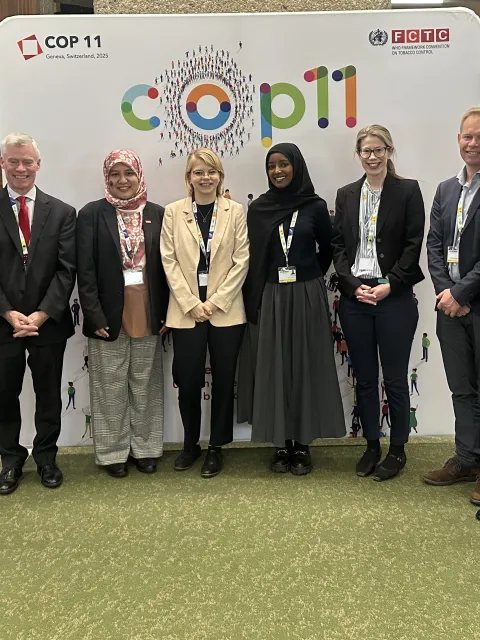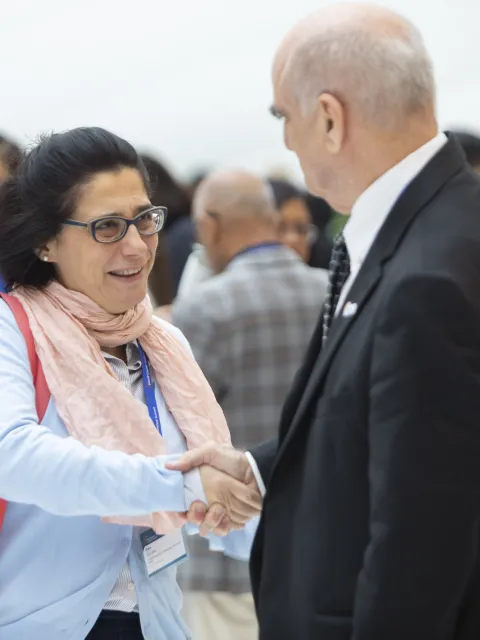UICC members in the MEA region work to reduce tobacco production and use
Many countries in low-resource settings face significant hurdles in enforcing anti-tobacco laws, enabling farmers to transition to alternative crops, and fighting the smuggling of chemicals and tobacco products.

The campaign for the 2022 World No Tobacco Day focuses on the environmental harms caused by tobacco production and consumption. These harms, which directly and indirectly undermine people’s health, compound the risks of developing cancer and other non-communicable diseases due to smoking and vaping.
UICC member organisations in Lebanon, Yemen and Zambia speak about the difficulties of raising awareness about these harms to people and the environment, as well as their work with health authorities and organisations and individuals on measures to reduce tobacco consumption and production. The Cancer Prevention and Control Program at Naef K. Basile Cancer Institute at the American University of Beirut Medical Center in Lebanon, the National Cancer Control Foundation in Yemen and the Zambian Cancer Society are part of UICC’s Cancer Advocates programme, which aims to strengthen the ability of participating organisations to advocate for improved cancer control in their countries.
All share their concerns about the lack of resources and available funding for tobacco control. They also highlight the influence exercised by the tobacco industry in opposing policy measures that can reduce the harms of tobacco. The “playing field” is hardly level: the combined net sales of the six largest tobacco companies amounted to USD 143 billion in 2020 – about twice the combined GDP of Yemen, Lebanon and Zambia.
Lebanon: a need to strengthen existing tobacco laws
Almost 43% of the population smoke in Lebanon, with tobacco contributing to some 22% of cancers, according to Dr Rihab Nasr, Director of Cancer Prevention and Control Program and Celine Abou Karam, Clinical Department Administrator, at the Naef K. Basile Cancer Institute, American University of Beirut Medical Center (AUBMC).
“A significant issue is the increasing acceptance of waterpipes or hookah shisha. Some 9% of young people between 13 and 15 years of age smoke, but the number who use waterpipes is much higher, over one-third. There is this conception that it is different and not as harmful, and it is even becoming an acceptable social habit.”
– Dr Rihab Nasr, Director of Cancer Prevention and Control Program, Naef K. Basile Cancer Institute, American University of Beirut Medical Center
The Naef K. Basile Cancer Institute has initiated several campaigns to raise awareness about the harms of smoking, including through public lectures and surveys on people’s knowledge of smoking to break misconceptions: The surveys revealed, for instance, that many people thought that smoking causes only lung cancer. There have also been campaigns targeting youth, in particular a country-wide competition where students were asked to submit a pictorial message or video raising awareness about cancer and smoking.
After Lebanon enacted the Framework Convention on Tobacco Control and implemented some of the recommended measures to reduce tobacco consumption, smoking rates dropped from 34.7 percent in 2008 to 25 percent in 2016. Rates have since risen considerably (43% as cited above) and they remain among the highest in the world, in large part due to weak implementation of existing tobacco laws and the considerable influence exerted by the tobacco industry.
“Smoking is supposed to be prohibited in closed public spaces, but people still smoke in restaurants and in other indoor places. There is a lot of turnover at the Ministry of Health so laws that were solidly implemented in the beginning are now no longer respected. The one thing the Ministry of Health was able to do despite the tobacco industry was to enforce warning labels on cigarette packages.”
– Celine Abou Karam, Clinical Department Administrator, Naef K. Basile Cancer Institute, American University of Beirut Medical Center
Dr Nasr and Ms Abou Karam also point to the high availability and affordability of cigarette products. Even with the ongoing economic crisis, they say, taxes must be increased. “A percentage of taxes could be used to fund lung cancer screening; however, the government strategy is not currently directed towards cancer prevention and control efforts,” says Ms Bou Karam. NKBI has initiated an AUBMC lung cancer screening programme, combined with a cessation programme, and there is a need for a national programme, notably to increase the availability and prescription of low-dose CT scans for heavy smokers.
Ending on an encouraging note, Dr Nasr says that the American University became the first smoke-free campus in Lebanon in 2018, influencing other universities to do the same.
Yemen: the harmful use of pesticides in tobacco production
Yemen is also confronted with the problem of weak implementation of tobacco laws. There is legislation, but many laws are not activated, according to Dr Labeeb Alaghbari, Consultant and former General Manager of the National Cancer Control Foundation.
“Many things have changed during the war, making it difficult to develop new legislation and enforce existing tobacco laws. We have done many campaigns to activate the ban against smoking in public places, for instance, but without success. Yet, these laws are key to tobacco prevention and cessation.”
– Dr Labeeb Alaghbari, Consultant and former General Manager of the National Cancer Control Foundation
Tobacco is also grown in Yemen and has seen an increase in production in recent years – at the expense of other products such as cotton, fruit, vegetables and coffee. The stimulant khat is also grown throughout Yemen, and is generally chewed, increasing risks for neck, throat and mouth cancers. “The farming of khat and tobacco has destroyed and damaged agricultural soil and has led to a lack of water for food crops,” says Dr Alaghbari.
The National Cancer Control Foundation in Yemen is also concerned about the risks for cancer and other health risks associated with the misuse of chemical pesticides in agriculture. These chemicals have been used widely in past years; many are banned products smuggled into the country and sold illegally, and their composition can be even more toxic than legal pesticides.
Several years ago, the Foundation ran a number of campaigns on this issue in the media and among the general public, and advocated for government action. The war, however, has made the situation extremely challenging.
“We have two governments, two ministries of health, so we must talk with both. We have also reached out farmers but while they are aware of the risks, they are also concerned with greater productivity. We truly need the support of civil society and additional funding, so we can increase our awareness campaigns and reverse the situation.”
– Dr Labeeb Alaghbari, Consultant and former General Manager of the National Cancer Control Foundation
Zambia: encouraging tobacco farmers to transition to alternative crops
Tobacco production in Zambia has increased markedly in the past quarter-century, with the land area dedicated to its cultivation expanding twenty-fold between 1996 and 2016, and the value of the export of tobacco leaf increasing from USD 1.4 million to USD 139.9 million. There are an estimated 20,000 farmers who cultivate tobacco in Zambia.
Tobacco farming is not easy and uses considerable quantities of natural resources, in particular water. A significant problem, according to Idah Phiri, Communications Officer of the Zambian Cancer Society, is that the tobacco industry provides not only loans but also technical support to farmers who agree to grow tobacco. “Those who want to farm other crops like soya beans don’t do so since there is no-one to show them how,” says Ms Phiri.
“Some people say tobacco is important to the economy. But if we look downstream at the costs to the health system, how much the government is spending on tobacco-related diseases and the environmental costs of tobacco farming, the costs are far higher than the benefits. The presence of tobacco is not helping but making Zambia poorer.”
– Idah Phiri, Communications Officer of the Zambian Cancer Society
Ms Phiri explains how tobacco farming requires three times the effort of farming other crops such as maize, coffee or cotton – “to produce a leaf that is a health risk and does not contribute to the economy. It also employs children – children who are therefore not going to school,” says Ms Phiri.
The Zambian Cancer Society through Zambia Non-Communicable Diseases Alliance has been advocating for the government to pass a tobacco and nicotine bill – since it was first submitted in 2008!
The bill includes recommendations to reduce tobacco production and raise taxes. It would support the transition of farmers to alternative crops, including with grants or loans, and includes measures to tackle illicit trade and smuggling. The bill would also raise taxes from the current rate of 37.3% of the retail price to the WHO-recommended rate of 75%. “We are pushing again as there is a new government,” said Ms Phiri
The Zambian Cancer Society has initiated several awareness campaigns about tobacco consumption, on TV, radio and social media – but, Ms Phiri says, “it is never enough”, especially with the growing presence of waterpipes, as in Lebanon.
“The tobacco industry is catching people when they are young and brainwashing them with advertising, using famous people to push their products. We are asking the government to ban advertising and we have engaged with a number of influencers to help raise awareness. Some join the cause, others stay with the tobacco industry – ‘it’s business’, they say.”
– Idah Phiri, Communications Officer of the Zambian Cancer Society
As in Lebanon and Yemen, Zambia would benefit from greater financial support from the international community to implement effective cancer control and reduce production. Ms Phiri says that the anti-tobacco community would also benefit from certified training to provide advocates with greater expertise and authority when issuing recommendations.
With respect to the environmental damage and health problems caused by tobacco production and waste, Idah Phiri says the government and the general public lack awareness of the issues but are sensitive to the arguments: the massive use of water, deforestation, impact on climate – reduced rainfall, so fewer crops and increased poverty and hunger – draining systems damaged by discarded cigarette butts, and exposure to respiratory, neurological and physical damage for tobacco farmers.
“Some people might be defensive in the beginning, when we expose all the dangers and health harms associated with tobacco production and consumption. But often they get back in touch after reviewing the material and actually ask to get involved in the anti-tobacco message. It’s very encouraging.”
– Idah Phiri, Communications Officer of the Zambian Cancer Society
Last update
Wednesday 08 June 2022
